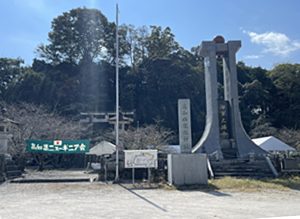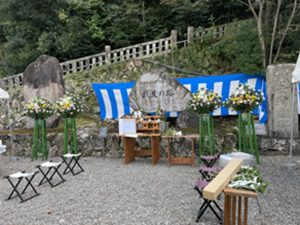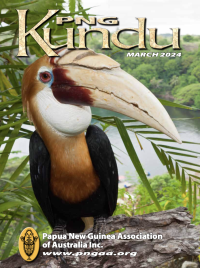Memorial Service in Japan – Peter Ryan
Recently I was invited as a special guest to a moving ceremony in Kochi – on the island of Shikoku, Japan. This ceremony was the Japan/New Guinea War Veterans Memorial Service, conducted by the Japan New Guinea Association and held at the Gokoku Shrine in Kochi.
The ceremony is held in October each year, and attended by the Governor of Kochi Prefecture, government officials, members of the Bereaved Families Association, Japan New Guinea Association members and relatives of the soldiers who fought and died in Papua New Guinea (PNG).
Kochi city and surrounding areas were the primary source of soldiers who formed the South Seas Detachment (Nankai Shitai) in World War II. In the main they were farmers and factory workers—and these soldiers fought in Rabaul, Kokoda and the beachheads Buna, Gona and Sanananda and at Lae.
My involvement began when, on one of my conducted tours of Kokoda, a Japanese trekker requested more information, from the Japanese perspective, regarding the battles fought, and particularly from the ordinary soldier’s perspective.

The flag says the Kochi New Guinea Association— the smaller monument on the right of the flag is the actual Kochi Prefecture Gokoku Shrine, and the tall one is the Japanese Navy shrine for WWI
Whilst I could give some information, I felt I could provide more. With the help of the Japanese trekker and Jun McLatchie we tracked down the Nankai Shitai in Kochi, and from there the Japan New Guinea Association. Mr Fukuda, a journalist in Kochi, provided great information and contacts for us—he has published a book (in Japanese only) on Kokichi Nishimura—known as The Bone Man of Kokoda (also the title of a book published in 2009 by Charles Happell, an Australian author). Nishimura spent 20 years based in Popondetta and Efogi finding and repatriating the remains of Japanese soldiers and was interviewed extensively by Fukuda for his book.
There is a declining audience for the ceremony in Kochi as relatives get older, and the younger generation is not actively involved, as this aspect of war history is not normally part of any school curriculum. Any interest shown is welcomed, and when those in Kochi received enquiries from Australia, they were most helpful in providing information. I was then formally invited to the ceremony and, as a member of the 2/14th Association (my father’s battalion), I was also encouraged to wear my father’s medals at the ceremony itself.
The questions before and after the ceremony went both ways, as I was asked about my father’s service, and in turn I was provided with stories about their relatives’ war stories. A few of the attendees had travelled to PNG in the past to view the battle sites where their relatives had fought and died.
There was a great interest for future co-operation, and future involvement from Australians was encouraged. Involvement of Australians would help lift the profile of the ceremony itself and perhaps increase attendance.
After returning to Australia, I was contacted again and there is now a proposal to organise a group of secondary school students from Kochi, and a similar group from Australia, to walk Kokoda together in 2025 (the anniversary of the end of World War II). There is a great deal of feeling in Japan about reconciliation and co-operation, and the concept of students from both countries walking together would go a long way with not only realising this aim, but also perhaps, keep the interest going.
The official ceremony itself was exceptional, and quite different from what we normally undertake in Australia. Whilst overseen by the Japan PNG Association, it is conducted in the main by priests, and involves traditional prayers, blessing and offerings and dancing (by a Shinto nun). There is a ‘cleansing’ ceremony where the priests ‘cleanse the crime’—as the wording in the ceremony says—‘cleansing crimes committed in daily activities which you know you should not be doing but cannot help saying or doing’.
As part of the Shinto tradition, special guests were invited to lay a branch of the Sakaki tree on the altar.
The speeches provided some information on the travails endured, and part of the speech included ‘we will continue to tell the horror of war and the preciousness of peace so that the war will not create orphans again’. If there is any involvement from Australia in future ceremonies, there will be an opportunity to include in the service a speech from an Australian representative.
If anyone would like more information, please feel free to contact me at: enquiries@wildtrektours.com.au



